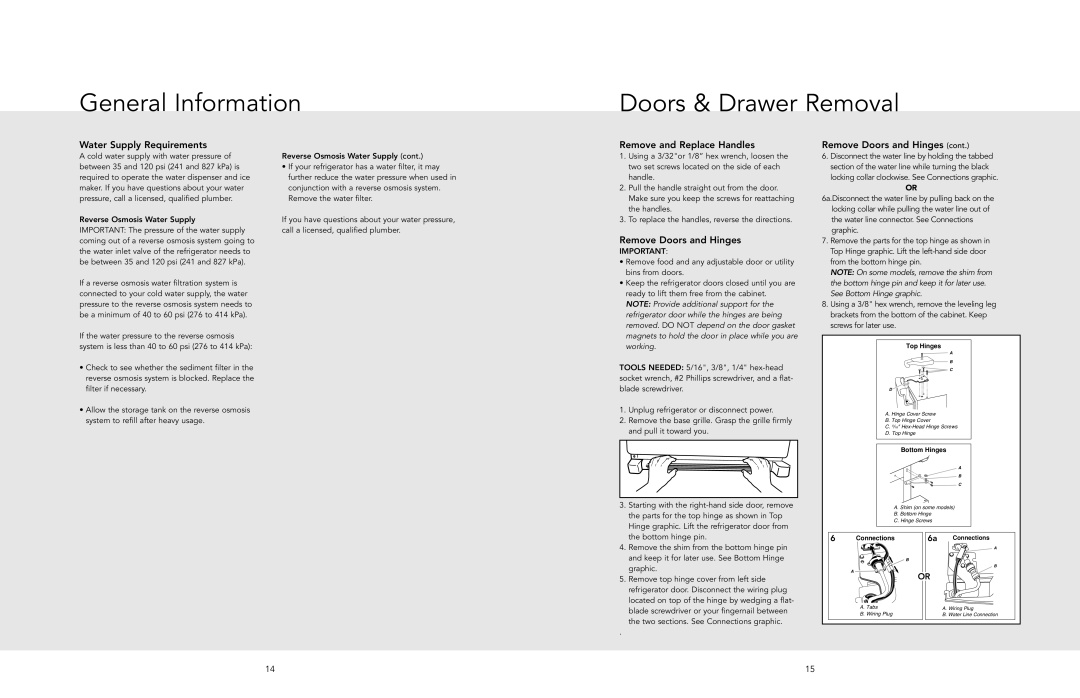
General Information
Doors & Drawer Removal
Water Supply Requirements
A cold water supply with water pressure of between 35 and 120 psi (241 and 827 kPa) is required to operate the water dispenser and ice maker. If you have questions about your water pressure, call a licensed, qualified plumber.
Reverse Osmosis Water Supply
IMPORTANT: The pressure of the water supply coming out of a reverse osmosis system going to the water inlet valve of the refrigerator needs to be between 35 and 120 psi (241 and 827 kPa).
If a reverse osmosis water filtration system is connected to your cold water supply, the water pressure to the reverse osmosis system needs to be a minimum of 40 to 60 psi (276 to 414 kPa).
If the water pressure to the reverse osmosis system is less than 40 to 60 psi (276 to 414 kPa):
•Check to see whether the sediment filter in the reverse osmosis system is blocked. Replace the filter if necessary.
•Allow the storage tank on the reverse osmosis system to refill after heavy usage.
Reverse Osmosis Water Supply (cont.)
•If your refrigerator has a water filter, it may further reduce the water pressure when used in conjunction with a reverse osmosis system. Remove the water filter.
If you have questions about your water pressure, call a licensed, qualified plumber.
Remove and Replace Handles
1.Using a 3/32"or 1/8” hex wrench, loosen the two set screws located on the side of each handle.
2.Pull the handle straight out from the door. Make sure you keep the screws for reattaching the handles.
3.To replace the handles, reverse the directions.
Remove Doors and Hinges
IMPORTANT:
•Remove food and any adjustable door or utility bins from doors.
•Keep the refrigerator doors closed until you are ready to lift them free from the cabinet.
NOTE: Provide additional support for the refrigerator door while the hinges are being removed. DO NOT depend on the door gasket magnets to hold the door in place while you are working.
TOOLS NEEDED: 5/16", 3/8", 1/4"
1.Unplug refrigerator or disconnect power.
2.Remove the base grille. Grasp the grille firmly and pull it toward you.
3.Starting with the
4.Remove the shim from the bottom hinge pin and keep it for later use. See Bottom Hinge graphic.
5.Remove top hinge cover from left side refrigerator door. Disconnect the wiring plug located on top of the hinge by wedging a flat- blade screwdriver or your fingernail between
the two sections. See Connections graphic.
.
Remove Doors and Hinges (cont.)
6.Disconnect the water line by holding the tabbed section of the water line while turning the black
locking collar clockwise. See Connections graphic.
OR
6a.Disconnect the water line by pulling back on the locking collar while pulling the water line out of the water line connector. See Connections graphic.
7.Remove the parts for the top hinge as shown in Top Hinge graphic. Lift the
NOTE: On some models, remove the shim from the bottom hinge pin and keep it for later use. See Bottom Hinge graphic.
8.Using a 3/8" hex wrench, remove the leveling leg brackets from the bottom of the cabinet. Keep screws for later use.
Top Hinges
A
B
C
D ![]()
A. Hinge Cover Screw
B. Top Hinge Cover
C.5/16"
D.Top Hinge
Bottom Hinges
A
B
C |
A. Shim (on some models)
B. Bottom Hinge
C. Hinge Screws
6 | Connections | 6a | Connections |
|
|
| A |
|
| B |
|
|
|
| B |
| A | OR |
|
|
|
| |
| A. Tabs |
| A. Wiring Plug |
| B. Wiring Plug |
| B. Water Line Connection |
14 | 15 |
